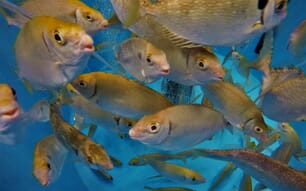Nifes has recently published an article on its website, which concludes that ”Farmed salmon fed a diet that does not contain enough marine raw ingredients have a greater risk of suffering a heart attack.”
The findings are from a sub-project of the extensive EU-funded Aquamax project. In the trial, salmon were fed a diet where 70 per cent of the fish oil was replaced with vegetable oil and 80 per cent of the fishmeal with vegetable proteins over a period of twelve months.
The article concludes that ”the feeding trial showed that salmon do not benefit from being vegetarians.”
Today’s commercial fish feeds usually contain 16-17 per cent fish oil and around 20 per cent fishmeal, which is slightly lower than only a few years ago. And the percentage of non-marine raw ingredients is above 50 per cent.
”The trial Nifes refers to is several years old and shows what can happen if the composition of nutrients is not correct. We were involved in these trials, and have learnt from the findings that both this and other research has shown,” Ms Rosenlund said.
Therefore, she believes this article gives a wrong impression about today’s reality.
“It is not primarily the ingredients that are important, but the nutrients. By compensating for vegetable raw ingredients generally not having an optimum composition of nutrients, through what we call MicroBalance we have developed a feed that does not give the problems Nifes refers to in its trials,” she said.
She emphasises that the research Nifes has done is very important.
“We must constantly push the boundaries and therefore, we must test what works and what does not. That's how you get ahead in the world. A good example of this is the problems that soy gave in earlier trials, but which have been overcome through research, so that a higher percentage of soy can now be used in salmon feed,” she said.
Ms Rosenlund said that development of knowledge that can reduce dependence on marine raw ingredients in salmon feed is necessary to ensure continued sustainable growth in the salmon industry. The trial at Nifes is one of many trials that contribute to this development of knowledge and which is included in further evaluations before changes are made to the commercial feed.
“In trials we have shown that we can reduce the content of the vegetable raw materials more than we have done today, without causing problems. You just have to make sure that the salmon are getting the right nutrients, and then it doesn’t matter if these are vegetable or not,” she said.
Vegetable Feed Does Not Cause Heart Problems
GLOBAL - The commercial feeds sold today, with a high content of vegetable raw ingredients, do not produce salmon with heart problems, Grethe Rosenlund, Senior Researcher at Skretting recently said in an intervju with the Norwegian netsite Kyst.no. She believes the findings Nifes recently published on its website are not valid for today's commercial fish feed.




